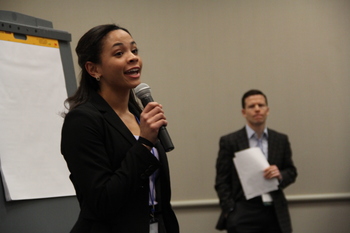Top 5 takeaways for Ann Arbor from the Governor's Economic Summit

Governor Rick Snyder's economic summit brought business leaders and economic development professionals together to brainstorm solutions for some of the state's most pressing issues.
Ben Freed | AnnArbor.com
Ann Arbor was well represented in Detroit Monday and Tuesday by business and economic development leaders. Here are five messages they should be bringing back to the business community to help us move forward in the coming year.
1. There is major progress that must be made in connecting talent with jobs
As we heard time and again at the summit, there are jobs that need to be filled, and there are talented people who need jobs. Unsurprisingly, there is work that needs to be done on both sides of the equation.
Employers and job seekers both often have expectations that are too high, and neither has proven particularly adept at initiating the face-to-face contact that is so necessary to matching the right person with the right position.
The most sought-after skills listed by the business leaders at the conference were “soft” skills like problem solving, critical thinking, and project management abilities. However, too many companies rely on human resources software programs to sort through resumes and determine the “best candidates for jobs."

Erin Benjamin, a Hillsdale College senior from Chelsea, was one of 21 students who attended the conference to showcase the state's young talent looking for jobs.
Ben Freed | AnnArbor.com
“It could be that 500 of those resume applicants were ‘problem solvers’ but that’s a tough skill for a computer program to catch. It’s not easily quantifiable.”
In his closing address, Gov. Rick Snyder told the crowd that businesses must begin to look at future employees the same way they look at customers.
“You have to go to them, you have to discover them, and you have to engage them,” he said.
2. We should learn from the companies that have cracked the code
“Some companies don’t have any problem finding the right people for their jobs,” Ann Arbor SPARK CEO Paul Krutko said. “But others do.”
There are certain local companies and even industries as a whole that have managed to figure out ways to immunize themselves from any real or perceived talent shortages that exist in the area. Many of those companies combine aggressive personnel recruiting with personal branding that makes them a desirable destination for job seekers.
“We have created a pipeline of talent by creating connections with the education system from the higher education level down to the middle school level,” Menlo Innovations CEO Rich Sheridan said.
Sheridan’s company rarely has difficulties in finding people to fill open jobs. He uses a system similar to the one employed by the financial and consulting industries that places a premium on personal interaction with perspective employees and a recruitment emphasis on culture, attitude, and drive.
3. Bubbles are transparent

A map created by Virtual Ink shows the interconnectedness of Michigan's economy.
Ben Freed | AnnArbor.com
At the conference however, the Ann Arbor delegation was not given a separate room for discussions or planning. Our business leaders were not set aside to work on their own problems or even put on a pedestal to preach our local successes.
“Working as a region, and with other people in the same industries as we are in across the state, you’re really able to see how we all face similar issues,” University Music Society education manager Omari Rush said.
Krutko also said that associating more with the rest of the state does not mean that you're competing with the rest of the state.
"We're not really competing with Grand Rapids and Detroit, we want them to succeed because it helps us compete with places like Boulder, Austin, and Seattle," he said.
4. Being on lists is important
It’s been well documented that Ann Arbor has made a number of national “top ten” lists for everything from quality of food to quality of retirement options. We often scoff at these lists, but for young talented college graduates, finding a place is often as important as finding a job.

One area where Ann Arbor is ahead of the game is in pairing innovation with entrepreneurship. The University of Michigan Office of Technology Transfer, the U-M Center for Entrepreneurship, startup incubators like Tech Brewery, and the I-Corp program are all prime examples.
Ben Freed | AnnArbor.com
Rush said his primary concern is making sure that the state funds programs that make Michigan more culturally attractive to young people and not just focus on the jobs themselves. For Krutko, PlaceMaking is a combination of culture and employment opportunity.
“We’re reaching a tipping point in which people not living in our community will see that they can have a serial career in Ann Arbor,” he said.
“Creating a cluster of good companies creates positive culture, but it also means that you don’t move here just for one job, but you come here knowing that if that job doesn’t work out, you won’t have to move on, there will be something else here for you.”
5. This is only the beginning
There is not going to be an immediate hiring spree following the summit, and students will not all of a sudden want to move into downtown Detroit or Ann Arbor.
“Really, we’ve just created a lot more work for ourselves,” Michigan Economic Development Coordinator Mike Finney said at the end of the conference.
“But now that we have more direction and input from the business community we can do better work that will really make a difference.”
At the end of the summit, the governor told the assembled business leaders that not only do they have to look at potential employees as customers, but they must start to view themselves as customers of the education system as well.
“And I invite you all to join me at the education summit that I’m holding next month,” he said, referring to the annual Governor’s Education Summit that will be held in April.
The summit did not solve every problem plaguing the state’s economy, but it did address a number of them and reframed some conversations about talent that could have lasting implications.
“I think you heard a real call to action here from the business community to itself,” MEDC vice president of talent enhancement Amy Cell said.
“Taking ownership of these issues is the first step and we’re going to have to keep the momentum we’ve stared here to keep our state moving in the right direction.”
Ben Freed covers business for AnnArbor.com. You can sign up here to receive Business Review updates every week. Reach out to Ben at 734-623-2528 or email him at benfreed@annarbor.com. Follow him on twitter @BFreedinA2


Comments
Veracity
Thu, Mar 21, 2013 : 7:40 p.m.
Why does it seem like the emphasis is on the young, new graduate? Where is the help for the 50 year old displaced worker whose manufacturing skills have been replaced by more productive robotics? Retraining programs and computerized job banks cost money and the governor will not spend money to end unemployment in Michigan.
Vivienne Armentrout
Thu, Mar 21, 2013 : 8:22 p.m.
These programs are not aimed at helping workers. They are aimed at creating a pool of useful work units to support an entrepreneurial effort. Thus the continual emphasis on "talent".
Lizzy Alfs
Thu, Mar 21, 2013 : 5:27 p.m.
Ben, great takeaways. There was a lot of information coming out of the two day summit, but I feel like this wrapped it up nicely for people in Ann Arbor. What Rich Sheridan said was interesting: "We have created a pipeline of talent by creating connections with the education system from the higher education level down to the middle school level." I'm curious: How does he create those connections, especially at the middle school level?
Gardener1
Fri, Mar 22, 2013 : 1:56 a.m.
Menlo has been a business partner with Forsythe Middle School. Most 7th graders at FMS visit the company. They experience the work environment and hear about how the company operates. More companies should reach out to the schools to provide an opportunity for the young people to see local businesses.
Veracity
Thu, Mar 21, 2013 : 7:35 p.m.
He doesn't. Its all "hot air" except for 6 foot middle schoolers who can be trained to play basketball.
An Arborigine
Thu, Mar 21, 2013 : 4:58 p.m.
I do hope they include higher taxes (elimination of homestead property tax, gas taxes, alcohol taxes, taxation of pensions) in their "PlaceMaking" efforts. Oh, and be sure to target the lower-tier teaching talent to this new "right-to-work" state, when other states don't restrict teacher benefits.
Dcam
Thu, Mar 21, 2013 : 2:07 p.m.
Take five bromides and problems disappear.
noyfb
Thu, Mar 21, 2013 : 1:27 p.m.
When the gov. ran Gateway Computers it was unquestionably thee worst company in the world. The products were terrible and the customer service was a complete joke. He ran it to the ground. He's now doing the same thing to OUR state! These kinds of corporate megalomaniacs live in an delusional universe far far away from reality. Paul Krutko, Rich Sheridan, these guys live in a meeting room with Power Point presentations with snappy sounding bullets. And that's how we make Michigan a better place to live... lol
Jeffersonian
Thu, Mar 21, 2013 : 6:24 p.m.
Follow the money.
ruminator
Thu, Mar 21, 2013 : 12:42 p.m.
Just corporate style babble. Blah, blah, blah ..........
Vivienne Armentrout
Thu, Mar 21, 2013 : 10:47 a.m.
"We often scoff at these lists" because so many of these are PR-based efforts by the Mayor's office. Do you really think that young talent is checking lists of which communities are endorsed by the podiatrists' association as a walkable community? It is the actual experience of living here that matters. The Project for Public Spaces focuses on placemaking and as you would guess, emphasizes public spaces. A recent post http://ht.ly/jdErc points out that vibrancy is people - so make room for more of them! Imagine that you are a young enthusiastic person looking for a place to love and your first experience is to drive or walk along Huron with its looming towers and ugly city hall. Will that inspire you? No wonder that all our Pure Michigan spots feature Main Street, with its historically protected human scale and charm. It also has that feature of public space - people walking, eating, talking. We need better public spaces in our downtown. Don't let the DDA block out the sun.
Vivienne Armentrout
Thu, Mar 21, 2013 : 8:35 p.m.
Yes, Lizzy, the lists might draw people in to look, but they will have to find something that they actually like before they stay. I doubt "lists" will make people pack suitcases and just show up. Of course, things like affordable decent apartments, walkable/bikeable streets and good transit, nice places to hang out with friends (preferably with craft beer, etc.) and other factors of daily living will also be important. I was amused by a talk given by a SPARK recruiter who brought talent in from California to look us over - in June. We'll need to have some reason to last through the winter, too. Actually, I can somewhat relate to the whole process since my husband and I made the decision to move here from Southern California. We were in our 40s, not "young" but there was a job decision to make and I left a tenured faculty position to move here. We visited after the first snow of the year, so it was a real test. What charmed me was the Old West Side and other older parts of town, plus the general cultural setting that is enabled by the UM. I do recall eating at the Original Cottage Inn and enjoying seeing the happy diverse crowd there. The newspaper seemed to present an actively engaged community. And there were trees. (SoCal can be pretty dry and barren away from the coast.) Also, we had gone to grad school in Madison and Ann Arbor evoked some of the same themes. So often these "talent" searches seem to imply that if you just supply a checklist of features, you can in essence put in an order for willing workers. But the feel of a community is different from a checklist.
Lizzy Alfs
Thu, Mar 21, 2013 : 5:26 p.m.
Vivienne: I think you're definitely right that the "actual experience" is what has the most influence, but I actually do think young people are paying attention to what's out there in the form of lists and other things. I always read those types of things (and my friends always post them on Facebook). I don't know Boulder well, but the press it receives made me want to visit and possibly even go to school there. Same thing with some other cities around the country.
timjbd
Thu, Mar 21, 2013 : 1:18 p.m.
I'm going to remake one of those "Pure Michigan" ads just using the sorts of development the DDA seems keen on bringing into downtown. See how many oohs and ahhs it gets.